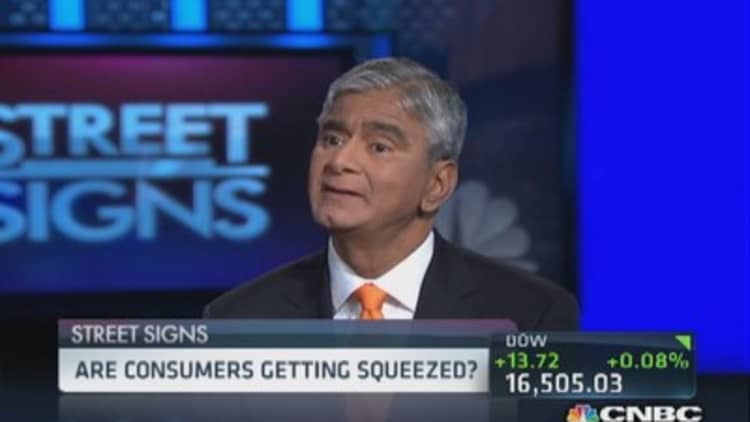Are big Wall Street investors and multinational oil companies to blame for high oil prices—and by extension, for expensive gasoline?
The answer, experts say, is both yes and no. A number of influences exert pressure on crude, an asset that's prone to dramatic price fluctuations. Geopolitics are the primary cause of oil price swings, though growth expectations, central bank policy and fuel exports are also major factors that come into play.
Though the average U.S. gasoline price has declined by about 4 cents since April 28, to $3.62 a gallon, according to GasBuddy.com, it's up substantially since early February, when a gallon cost about $3.27 on average.
Both Wall Street and Big Oil take heat from frustrated consumers who blame them for energy prices, and not without reason. Energy companies such as ExxonMobil, Chevron, ConocoPhillips and Valero benefit when oil and gas prices are on the rise. Yet for Big Oil, the boost from energy prices has been marginal at best for their bottom line. Meanwhile, nobody benefits in the long-term if high energy prices eat into disposable income.
Read MoreGas prices shouldn't be high, but are. Here's why
That said, at least some of the run-up can be attributed to speculators, who have been accused in the past of manipulating crude prices and are active market participants. The latest data from the Commodity Futures Trading Commission showed speculators—who as a group haven't been short oil for nearly two years—loading up on bets that crude will continue to climb, though positioning was well below a multi-year high reached in late 2013.
"Typically traders, speculators and money managers are trying to gauge (the) current supply situation and medium-term outlook," said Justin Jenkins, research analyst at Raymond James. "When you combine tensions outside the U.S. with relatively limited (domestic) supply, it makes the market ripe for more than usual speculation."
Fadel Gheit, energy analyst at Oppenheimer, said in an email to CNBC that geopolitical factors such as turmoil in Libya and Ukraine are the main factors buttressing oil and gas prices. Still, "the entire energy complex is elevated by $20 per barrel, purely on speculation," Gheit said.
However esoteric the factors, they matter because of the spillover effect on retail gas, which is tightly linked to the price of Brent crude. With retail gasoline recently hovering uncomfortably close to $4 a gallon in some places, it acts as a de facto tax on consumers and dampens economic growth. Frothy oil and gas prices in the context of an underwhelming recovery have bedeviled many economists.
"We're still in the great recession, in Europe and the U.S.," said Steve H. Hanke, professor of applied economics at The Johns Hopkins University and a scholar at the Libertarian Cato Institute. "My expectation has been for some time that energy prices should be going south, but they haven't."
Read MoreJobs vs. GDP: Which is it?
Don't forget the effect of exports

Some analysts say the seemingly inexorable climb in energy prices also can be traced back to U.S. fuel exports. Even though America has an insatiable demand of its own for oil and gas, it ships a combined 3 million barrels of gas, diesel, distillates and propane abroad per day, according to Energy Information Administration statistics. During the recent, tundra-like winter, export volumes actually surged to 3.7 million barrels per day, which may help explain why domestic energy prices skyrocketed.
That amounts to more than a billion barrels a year, an amount Richard Hastings, macro strategist at Global Hunter Securities, said is nearly 70 percent more than what the U.S. exported back in 2008.
"The U.S. has become such a big exporter of fuel that it winds up getting priced at international market prices," represented by the Brent crude contract, Hastings said. Brent trades at a premium to West Texas Intermediate, the customary domestic benchmark.
Read MoreChina and Russia sign big natural gas agreement
For the last five years, domestic gas prices rose alongside export volumes nearly 75 percent of the time, said Hastings, who added that fuel shipments exert far more upward pressure on energy prices than speculators. Service stations also tend to mark up gas prices in order to account for the price of ethanol, Hastings added, which in March soared to a seven-year high.
"Gasoline stations know you can't get control over ethanol or crude, so they smooth it out and mark up (gasoline prices) even if ethanol costs go down," Hastings said. "The retail part of the business knows costs are going to go right back up."
—By CNBC's Javier David.





